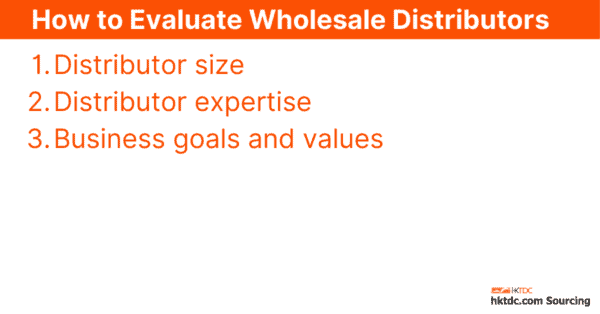In modern days, especially having experienced worldwide lockdowns, it is safe to say many of us have converted to online shopping and have experience in doing so. But you may have already noticed: most of the time as you shop online, the product you purchase has little correlation to the merchant who sells it to you – neither do they make nor source the product themselves. This is all thanks to the business model of wholesale distribution.
Across the globe, merchants often apply wholesale distribution sources to bulk-purchase a huge lot of products at a discounted wholesale rate. Then, the merchant would sell them at retail price to make a profit. Within the product supply chains, there can be many “middlemen” before the product moves down the pipeline from the manufacturer to the consumer. Such middlemen are most likely wholesale distributors.
Now the question is, how do you find a wholesale distributor?
This is the crux to your eCommerce success. As one of the most important decisions one has to make as a merchant, your choice of the wholesale distributor can already determine 2 major trajectories of your business:
- how to diversify your products;
- how to ramp up the inventory and stock level.
Given the gravity of the matter, it is worth taking a deep dive into the subject. This article will explain to you as retailers about the what, why, and how of finding wholesale distributors. We will also provide top tips on where to find vendors and how to evaluate them. By the end of this article, we hope this will lead you to vendors that sell at favorable prices, in a timely manner, and with impeccable services.
What is a Wholesale Distributor?
A wholesale distributor is a business – be it a person or a company – that buys products from manufacturers in bulk quantities and resells them, most often to other retail businesses.
Distributors play a vital role in closing the gap between manufacturers and small business owners. By not operating a store and focusing solely on providing retailers with merchandise, distributors look for retailers as product outlets instead of customers. And through retailers, the products can finally reach direct customers.
Now, how can you differentiate between a manufacturer, a wholesale distributor, and a retailer? By nature, each of them serves slightly different purposes in the supply chain.
A manufacturer is usually the party that creates the products they sell, which as a result often lacks the time or resources to create or find direct sales outlets.
Wholesale distributors order products from a manufacturer in bulk quantities. This way, they can gain access to products at a lower, distributors’ special price. Then, by selling those products to the next party in the chain, usually a retailer, they make a profit.
Finally, the retailer sells the product to the customer.
Throughout the supply chain, each layer adds value and cost to the product, hence a slight jump in price as the product moves down each link.
The Various Types of Wholesale Distributors
As we look for wholesale distributors, not only do we focus on the niche that matches our business sector. But more importantly, we should first look into the distribution channels available in our industry. When it comes to wholesale distribution, there can be many stakeholders and different parties involved, each with a different role to serve in the supply chain.
Hence, by choosing a different distributor, you can end up choosing a totally different distribution trajectory for your product.
There are 3 most common types of distributors you should know of:
Manufacturers often sell products directly to ecommerce owners. This usually only happens when the manufacturers are small and run on a one-man-band. This is also the best option for you as a retailer- your manufacturer would be your direct wholesale vendor, cutting out all the middlemen.
Importer, also known as exclusive distributor, refers to someone who has the only access to a certain product in a restricted geographical area. The importer would either sell the product to retailers directly or wholesalers who will then resell the products to retailers.
Wholesalers, or regional distributors, source products in huge, boxcar-sized quantities. They then transport the products from regional channels to local wholesalers, who would then resell to retailers.
Why Work With Wholesale Distributors?
Before we go into the why, you will first need to understand what the role of a wholesale distributor is, and what purpose they can serve in the supply chain.
A wholesale distributor is essentially someone who stocks products in large quantities and makes profits by selling them to retailers. Unlike retailers who may negotiate product by product with the manufacturer, wholesalers can offer an individual deal where the retailer can order a wide array of products in one go.
The advantage for retailers is apparent. Trading with a distributor instead of the manufacturer takes MOQ requirements off the negotiation table – you enjoy the flexibility to customize your own deal at better prices and quantities according to your business scale. What’s more, distributors can even take back unsold products to facilitate the retailer.
Wholesalers also help save time in negotiations. Instead of approaching dozens of manufacturers, you just have to find one good distributor with great product selections made with great quality control. In most cases, distributors have a steady stream of product supply as well. That way, you can spend less time on inventory replenishment or sourcing products from different manufacturers once they run out.
Another pros distributors have over manufacturers is that they would take up the duty of storing and shipping products. In other ways, you do not have to spend time sorting out packaging and shipping logistics. This is, in a way, outsourcing some time-consuming labor work in a cost-effective manner.
In many markets, the distributors also handle similar products and/or brands so that they could provide the one-stop shop service to retailers.
Tips for Finding a Wholesale Distributor

1. Learn the Distribution Channels of your Industry
All roads lead to Rome. There are various channels to move a product down the supply chain from a manufacturer to a retailer. Since every wholesaler may work a bit differently and reach different markets, knowing your options in terms of industry-standard distribution channels can help you narrow down your search for the right wholesale supplier.
As explained above, there are different types of wholesalers – manufacturer, importer, wholesaler, and jobbers – each with slightly different job natures. By maneuvering such natures, you can work it in favor of your business’s best interest. For example, retailers often will bulk-purchase more to ramp up product order volume and cut out jobbers from the chain. In other cases, some importers may go to retailers directly given the smaller market and industry niche, depending on the case. Every industry operates quite differently according to the industry’s nature. This could affect the product, region, and country involved in distribution channels.
As you first start trading with a distributor, you can start smaller with a smaller wholesaler at higher unit prices. Gradually, when the trade volume ramps up, the unit price will go down, or you could even approach a bigger wholesaler up the supply chain.
2. Choose Manufacturers over Wholesalers
Manufacturers are always a better option than wholesalers, the reason being the latter will take a cut in your profits as a middleman. To maximize your marginal gains, you should approach the top layer of the supply chain.
For branded products, it is best to speak directly to the product manufacturer. The only challenge they may pose is you meeting their MOQ requirements. In case the negotiations do not go well and the manufacturer finds your business too small to sell you products, you can ask them for their trusted distributors as an alternative supplier.
Remember, the goal is to minimize the number of middlemen in your supply chain. That way, you can further cut down your costs, and give you more leeway to stay competitive amongst your competitions.
Additional tip: Be sure to ask for samples as you contact your manufacturer. This could help you assess the product quality before you make a huge bulk order to meet the MOQ requirements,
3. Make a Qualitative First Contact With a Wholesale Distributor
Initiate contact with wholesale distributors. You can either obtain this list from the manufacturer, phonebook listings, or a wholesale directory – you can also easily find one via key platforms such as The Balance and alikes. With the first contact, the key information you need to gather includes the MOQ, the wholesale unit prices, and the region this distributor supports.
We suggest making the first contact via phone call or email; follow up with another phone call if you have more to ask about or have decided to proceed with this wholesale distributor. Be transparent and vocal about what you look for from this distributor; don’t get too boastful or full of yourself yet. An honest conversation will save you so much time in finding the right distributor.
There is no harm in letting your correspondence know about the fact that you are doing wholesale distributor research and looking at other options as well. In fact, this gives you a competitive edge in getting better prices, even as a small ecommerce business.
4. Check Major B2B Marketplaces
There are many large B2B marketplaces online where you can buy large lots of products at low prices. Alibaba.com is one of the largest B2B marketplaces of manufacturers, importers, and wholesale distributors. If you prefer verified vendors, hktdc.com Sourcing could be your best choice.
Go by countries and regions as you search for a marketplace. You can also sort by industries when looking for industry-specific B2B marketplaces. Often, such platforms can support only 1 regional market or have multiple global networks to reach retailers across the globe.
The manufacturers would also be able to refer you to the distributors handling their products distribution if your retail channels are under their “jurisdiction”, which is usually bound by contractual agreement between the manufacturers and suppliers.
5. Visit a Trade Show
As old school as this may sound, trade shows are still to date one of the most effective ways to network and grow your business. They serve as great platforms for retailers, distributors, and manufacturers to network under the same roof.
Under the setting of trade shows, you can easily meet and speak directly to many wholesalers or manufacturers in one go. Compared to email exchanges and blind searches online, in-real-life encounters can enhance effective communications and build trustworthy relationships.
To attend trade shows, HKTDC’s extensive network and robust event calendar could be a great place to start. Book yourself one that is suitable for your business – search by industries, niches, dates, and availability.

How to Evaluate Wholesale Distributors
But our goal here is not to just gather leads and contacts of distributors. We are here to help you find a wholesale distributor – one that is right for your ecommerce business.
To assess their compatibility, come up with your list of criteria. Reflect thoroughly on your business needs and capacities, objectives, and visions. Ask yourself what your business would look like in 6 months’ time as well as in 5 years’ time.
Next, you can ideate the “optimal” profile for this wholesale distributor. As you come up with your criteria, consider the following factors:
- Distributor size: Business sizes matter as they imply different level of support/services. Although one may always go to the biggest business partner available in the market and assume it is the best by default. But in reality, it is about the fit/match instead of only number of employees. Big firms may often not be able to provide the attention and guidance small businesses need. One should also not forget to assess the size of their own business. Finding someone compatible and more accommodating may be a wiser, more sensible choice.
- Distributor expertise: For generic products, an all-purpose general distributor should do the work. In case you are selling a niche product that requires some expertise and knowledge of a certain field, you may want to find a distributor with a certain niche. For example, if you’re selling medical products, you should probably look for distributors who at least have some basic medical background and knowledge, so that they would understand the products better.
- Business goals and values: Goal and vision alignments are just as important as the business itself. Find yourself a distributor that shares your goals and values. For example, if prioritizing small businesses and sustainability are part of your company’s core values, then pick a wholesale distributor that would practice such work ethics likewise. Similarly, if your goal is to go big for the top retailers and unleash your business potentials, then again find a partner who could do the same.

Conclusion
Finding a wholesale distributor is not too different from dating: both parties get to assess if they make a good match for each other. If you are able to find someone who wants to work with you, and likewise vice versa, then congratulations – you’ve found yourself the right wholesale distributor!
Before you start searching for your ideal distributor, let’s not forget that there are some grossly important factors that would make your eCommerce business appealing to distributors, too – proof of sales, and customer demand. So remember, alongside the search for a wholesale distributor, be sure to create an online store and start making sales. That way, not only do you provide online channels yourself, but it also boosts the chances of locking down a top wholesale distributor.




















